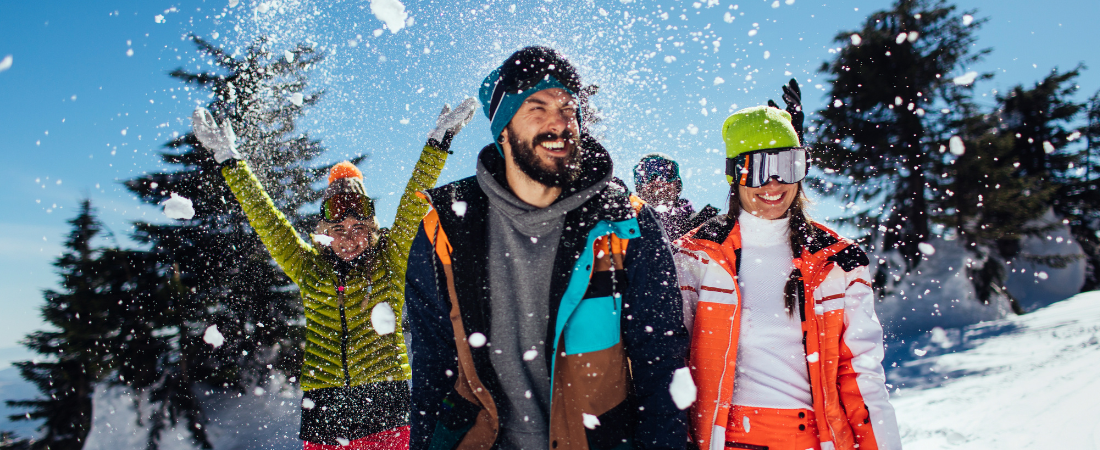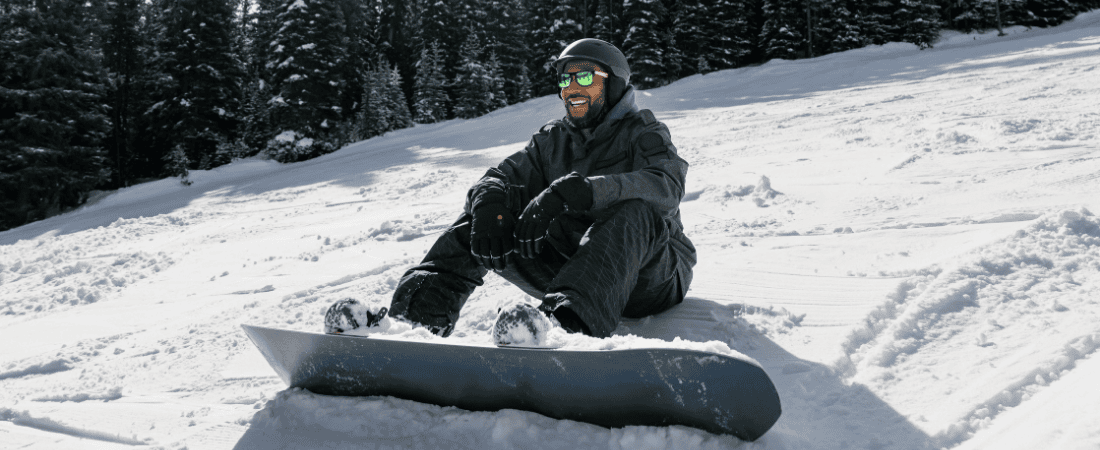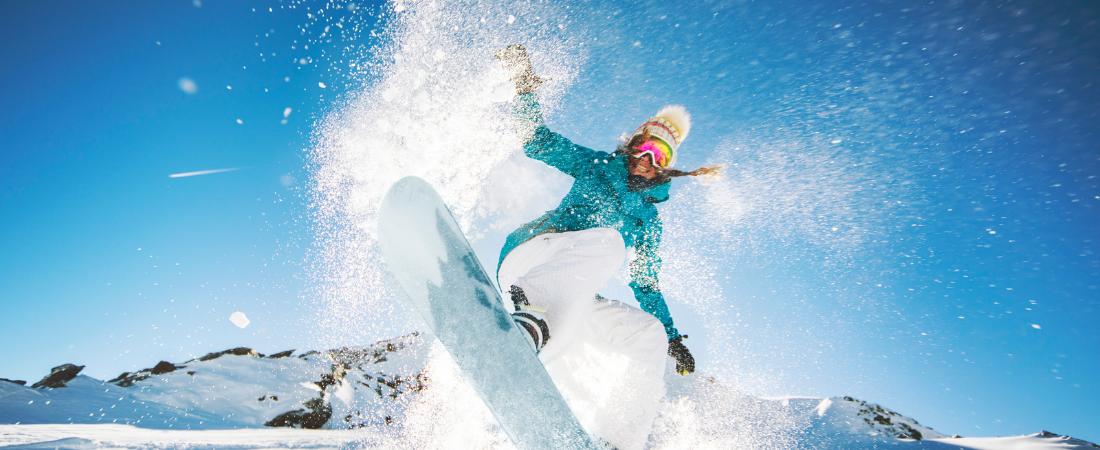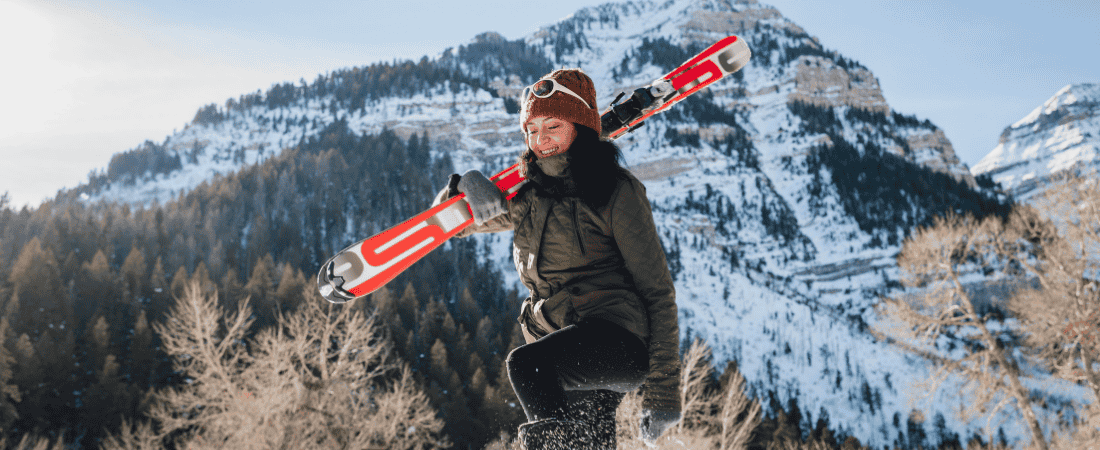Winter snow holiday tips for first-timers and pros

Source: Getty Images
16 handy things to know before heading to the slopes
Craving powder days and snow-dusted adventures? You’d probably like some winter snow holiday tips. Whether you’re a first-time skier on the bunny slopes or you're nailing that switch ollie like a pro, we’ve got pointers for you.
Keep reading to learn how to master your first snow sports trip, pack smarter and travel lighter, protect your snow sports gear (and your holiday!), and stay healthy and energised while you carve and glide.
Your ultimate snow holiday starts here.
Curious about protecting your snow trip? Explore our Snow Sports Cover or get a travel insurance quote today
Planning to hit the slopes? Here are 16 winter snow holiday tips:
- 7 handy tips for first-time skiers and snowboarders
- 4 smart ways to stay well while carving the snow
- 5 secrets for keeping your ski and snowboarding gear safe

Source: Getty Images
7 handy tips for first-time skiers and snowboarders
Good to know: if you want your cover to apply while making the most of these tips, you’ll need to get our Snow Sports Cover. There’s more info on what is and isn’t included in it on our Product Disclosure Statement (PDS). Give it a read before you lock in your cover.
1. Layer like a pro
Crisp mornings. Cosy evenings by the fire. Welcome to the snow! While it’s going to be cold outside (hello sub-zero temps!), the indoors is a whole other story. Most places crank up the heating to a toasty 20°C or even have roaring fireplaces.
Your wardrobe saviour? Layers! Slip on non-bulky layers under your snow jacket. They’ll keep you warm when you’re outside and are easy to peel off for a quick cool down indoors.
Comfort and style – tick, tick!
2. Thermals = game changers
Thermals are like a secret weapon against the cold. These nifty base layers trap your body heat while letting your skin breathe. This can help you stay warm without overheating.
Look for lightweight, non-bulky options that are comfy enough for a day on the slopes and snug enough for lounging back at the chalet.
3. Accessorise for maximum warmth
Hands freezing? Ears stinging? That mountain chill is no joke! Don’t forget your snow-ready accessories. Pack a snug beanie or hat, cosy gloves and a scarf or neck warmer.
A little bit of added warmth can go a long way, turning shivering into shredding swiftly.
4. Watch your step
Snow can be soft, sticky, icy, and everything in between. Icy snow’s the sneaky one. It can send you sliding if you’re not careful.
The heroes of the day? Grippy, water-resistant boots. They’ll keep your feet dry, warm, and firmly planted. For extra traction, grab some snow boot covers (crampons or ice grips). Think of them as socks with superpowers for your shoes.
5. Don’t forget your SPF
Picture this. Bright sunshine. Sparkling white snow. Gorgeous, right?
But, sneaky UV rays are bouncing everywhere! Higher altitudes mean stronger UV, and snow reflects it straight back at you.
So, slap on some sunscreen before you hit the slopes. And, don’t forget to reapply during the day. Your future, sunburn-free self will thank you.
6. Stay hydrated
A fun fact for first-time skiers – cold weather doesn’t make you immune to dehydration. When it’s chilly, your body pulls out all the stops to conserve heat. This can make you feel less thirsty.
But don’t be fooled! Drink water often to stay energised and ready for all-day action on the slopes.
7. Moisturise well and often
The winter air can turn your skin into a desert. Dry hands, chapped lips, itchy everything – it’s not the vibe you’re going for on your snow adventure.
Some winter snow holiday tips for first-time skiers and snowboarders: Keep lip balm in your pocket, and switch to a richer, winter-friendly moisturiser to keep your skin healthy and happy.

Source: Getty Images
4 smart ways to stay well while carving the snow
A winter sports holiday is all kinds of awesome, but the snow life comes with its own set of challenges.
Want some winter snow holiday tips to keep you snowboarding longer and skiing stronger? We’ve got some essential health pointers for fun-loving snow seekers.
1. Watch out for alpine sickness
Snowy mountains = Insta-perfect scenery. But behind those jaw-dropping backdrops lies some thin alpine air. And with lower oxygen levels, some people can experience alpine sickness. Symptoms like headaches, nausea, and even the dreaded vomiting can pop up quicker than you expect.
Plus, skiing and snowboarding can give those muscles a serious workout, especially if you're not used to it. Here’s a ski holiday tip: to help your body bounce back, fuel up on protein-packed treats (think lean meats, nuts, or tofu) and energy-boosting carbs. This’ll help you speed up recovery and get you back on the slopes pronto too.
2. Drink water even if you don’t feel thirsty
When you think of places where you need hydration, it’s easy to imagine hot beaches rather than snowy peaks. But here’s the twist: staying hydrated in the cold is just as important. The frosty alpine air can ramp up water loss through breath and sweat, even when you don’t feel thirsty.
You’ll also lose fluids faster at higher altitudes due to diuresis (translation: extra bathroom breaks). To keep your body moving like a pro, sip water throughout the day, even if your thirst metre says otherwise. A bonus perk? Staying hydrated helps fend off muscle damage, so you can keep the snowy good vibes rolling.
3. Après ski ≠ après hydration!
We get it. Après ski culture can be a big part of a snow trip. But here’s the deal with alcohol – it definitely isn’t your hydration buddy.
Alcohol tends to speed up fluid loss. It’ll also tamper with your reaction time and focus, both of which you need to stay sharp on the slopes. It might jeopardise your cover too.
Here’s a tip for first-time skiers and snowboarders, and seasoned pros too: limit the booze. It’ll help you keep those reflexes quick and reduce the chance of injuries.
4. Fuel your body with nutritious food
Snow sports aren’t just fun; they’re a full-body workout. Your legs burn, your core twists, and by the end of the day, your energy's zapped. The solution? Treat your body like a snow-powered machine and fuel up right.
Start the day with a carb-heavy brekkie (hello pancakes, porridge, or toast). Then, keep those energy levels topped up with snacks you can carry in your jacket. A stash of dried fruit, low-fat muesli bars, or even sports gels will keep you going. Stop regularly to recharge and refuel – no one does their best shredding on empty.

Source: Getty Images
5 secrets for keeping your ski and snowboarding gear safe
Whether you’re a seasoned slope shredder or a first-time snow chaser, your luggage is bound to include some pretty special cargo. From skis to snowboards, your gear is more than just equipment – it’s your ticket to an incredible snow adventure!
Keen to keep your prized possessions safe, sound, and slope-ready? Here are five handy winter snow holiday tips for protecting your snow gear.
1. Get cover for your snow gear
Snow gear isn’t cheap, and the last thing you want is to lose or damage it. That’s where our Cover-More travel insurance can help. Thanks to our luggage and travel documents cover, your ski and snowboarding equipment have cover for loss, damage, or theft. And if you’ve got that extra-fancy gear, you can even increase the cover limit for an additional premium.
Good to know: we don’t cover snow sports gear while you’re using it. You’ll find all the must-know info about our luggage and travel documents cover in our PDS.
2. Keep it close
You wouldn’t leave your phone unattended in a café, right? So, why risk it with your ski gear!
Our luggage cover applies only when your items are under your watchful eye. Keep your belongings with you or store them securely to avoid any disappearing acts. After all, it’s much easier to guard your gear than replace it.
3. Get the right gear
Ill-fitting gear isn’t just uncomfortable; it’s a recipe for trouble. Skis that don’t match your skill level? Boots that pinch? Not only do they risk getting damaged, but they could also leave you nursing an injury. So, invest in quality gear that fits well.
4. Warm up and stretch it out
Skiing and snowboarding are intense workouts that push your muscles in all kinds of directions. A proper warm-up and some pre-slope stretching can make the difference between smooth carving and a day stuck nursing sore muscles (or worse) at the lodge.
Stay limber, stay safe, and keep having fun out there.
5. Learn before you leap
Even if you’re the adventurous type, there’s no shame in starting slow. Take lessons from a qualified instructor to build a strong foundation of skills.
Poor technique isn’t just bad for your skiing style; it’s also a fast track to damaging your gear – or yourself. Practising the right moves will help you enjoy every second in the snow without setbacks.
Ready to kick-start your winter snow holiday with our tips?
Our snow sports cover may come in handy if things take an unexpected turn.
Material on this website is provided for informational purposes only. It is general information and discussion about medicine, health and related subjects may not apply to you as an individual and is not a substitute for your own doctor’s medical care or advice. The words and other content provided on this website, and in any linked materials, are not intended and should not be construed as medical advice. If the reader or any other person has a medical concern, they should consult with an appropriately licensed physician or other health care worker. Nothing contained on the website is intended to establish a physician-patient relationship, to replace the services of a trained physician or health care professional, or otherwise to be a substitute for professional medical advice, diagnosis, or treatment. The views and opinions expressed on this website have no relation to those of any academic, hospital, practice, or other institution with which the authors are affiliated. They do not necessarily reflect the opinions of Cover-More Insurance Services Pty Ltd. Never disregard medical advice or delay seeking medical care because of something you have read on or accessed through this website. If you think you may have a medical emergency, call your doctor or emergency services immediately.